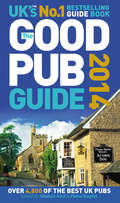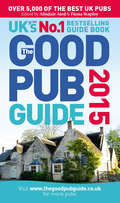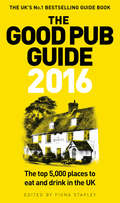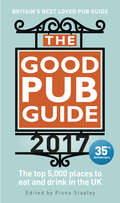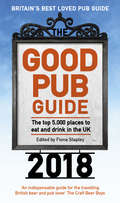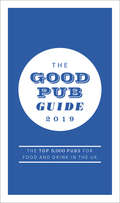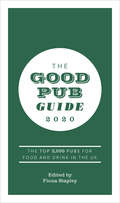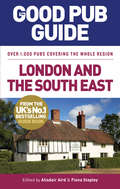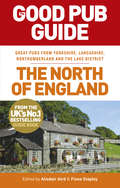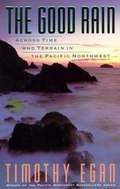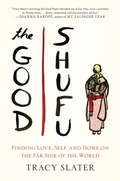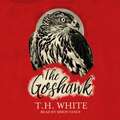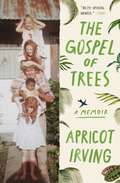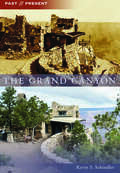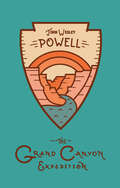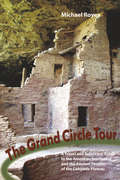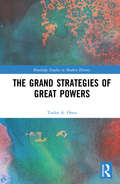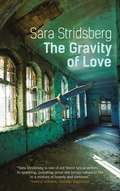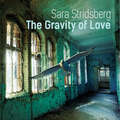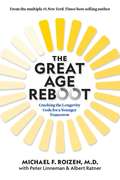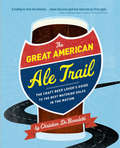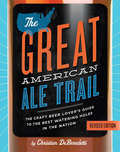- Table View
- List View
The Good Pub Guide 2014
by Alisdair Aird Fiona StapleyThe 32nd edition of The Good Pub Guide is as invaluable as ever. Organised county by county, its comprehensive yearly updates and countless reader recommendations ensure that only the very best pubs make the grade.Here you will find classic country pubs, town-centre inns, riverside retreats, historic havens and exciting newcomers, plus gastropubs and pubs specialising in malt whisky or own-brew beer. Discover the top pubs in each county for beer, dining and accommodation, and find out the winners of the coveted titles of Pub of the Year and Landlord of the Year. Packed with hidden gems, The Good Pub Guide 2014 provides a wealth of honest, entertaining and indispensable information.Whether you are planning a night out, a weekend away, holidaying in the UK or simply looking for a local pub, Alisdair Aird and Fiona Stapley have it covered.
The Good Pub Guide 2015
by Alisdair Aird Fiona StapleyThe 33rd edition of this much loved guide is as invaluable as ever. Organized county by county, its comprehensive yearly updates and countless reader recommendations ensure that only the very best pubs make the grade.Here you will find classic country pubs, town-centre inns, riverside retreats, historic havens and exciting newcomers, plus gastropubs and pubs specialising in malt whisky or craft beer. Discover the top pubs in each country for beer, food and accommodation, and find out the winners of the coveted titles of Pub of the Year and Landlord of the Year. Packed with hidden gems, The Good Pub Guide provides a wealth of honest, entertaining and indispensable information.
The Good Pub Guide 2016
by Fiona StapleyThe 34th edition of this much-loved guide is as invaluable as ever. Organized county by county, its comprehensive yearly updates and countless reader recommendations ensure that only the very best pubs make the grade.Here you will not only find classic country pubs, town centre inns, riverside retreats and historic havens, but also popular newcomers including gastropubs and pubs specialising in malt whisky and craft beer.Discover the top pubs in each country for beer, food and accommodation, and find out the winners of the coveted titles of Pub of the Year and Landlord of the Year. Packed with hidden gems, The Good Pub Guide provides a wealth of honest, entertaining, up-to-date and indispensable information.
The Good Pub Guide 2017
by Fiona Stapley*With 10% more content than other beer and pub guides, and over 100 new entries this year*The 35th edition of this much-loved guide is as invaluable as ever. Organized county by county, its comprehensive yearly updates and countless reader recommendations ensure that only the very best pubs make the grade.Here you will not only find classic country pubs, town centre inns, riverside retreats and historic havens, but also popular newcomers including gastro pubs and pubs specialising in malt whisky and craft beer.Discover the top pubs in each country for beer, food and accommodation, and find out the winners of the coveted titles of Pub of the Year and Landlord of the Year. Packed with hidden gems, The Good Pub Guide provides a wealth of honest, entertaining, up-to-date and indispensable information.
The Good Pub Guide 2018
by Fiona Stapley*Get your pub on with 10% more content than other beer and pub guides, and over 80 new entries this year*The 36th edition of this much-loved guide is as invaluable as ever. Organized county by county, its comprehensive yearly updates and countless reader recommendations ensure that only the very best pubs make the grade.Here you will not only find classic country pubs, town centre inns, riverside retreats and historic havens, but also popular newcomers including gastro pubs and pubs specialising in malt whisky and craft beer.Discover the top pubs in each country for beer, food and accommodation, and find out the winners of the coveted titles of Pub of the Year and Landlord of the Year. Packed with hidden gems, The Good Pub Guide provides a wealth of honest, entertaining, up-to-date and indispensable information.
The Good Pub Guide 2019
by Fiona StapleyBritain's bestselling travel guide for over 30 years and the only truly independent guide of its kind.***Featured in the Guardian, the Times and Mail Online and on BBC Radio 4***The 37th edition of this much-loved book is as irreplaceable as ever. Organised county by county, its yearly updates and reader recommendations ensure that only the best pubs make the grade. Here you will not only find a fantastic range of countryside havens, bustling inns and riverside retreats, but also a growing number of gastropubs and pubs specialising in malt whiskey and craft beers.Discover the top pubs in each county for beer, food and accommodation, and find out the winners of the coveted titles of Pub of the Year and landlord of the Year. Packed with hidden gems, The Good Pub Guide continues to provide a wealth of honest, entertaining and up-to-date information on the countries drinking establishments.
The Good Pub Guide 2020
by Fiona StapleyBritain's bestselling travel guide for over 35 years and the only truly independent pub guide of its kind.***Featured in the Guardian, the Times and Mail Online and on BBC Radio 4***The 38th edition of this much-loved book is as irreplaceable as ever. Organised county by county, its yearly updates and reader recommendations ensure that only the best pubs make the grade. Here you will not only find a fantastic range of countryside havens, bustling inns and riverside retreats, but also pubs known for their excellent food, some specialising in malt whiskey and craft beers.Discover the top pubs in each county for beer, food and accommodation, and find out the winners of the coveted titles of Pub of the Year and landlord of the Year. Packed with hidden gems, The Good Pub Guide continues to provide a wealth of honest, entertaining and up-to-date information on the countries drinking establishments.
The Good Pub Guide: London and the South East
by Alisdair Aird Fiona StapleyThis handy portable guide features up-to-date information, including food, drinks, facilities and opening hours, for the best pubs in London and the south east of England, as chosen by the highly respected editors of the annual Good Pub Guide. Spanning Berkshire, Buckinghamshire, Hampshire, Isle of Wight, Kent, Oxfordshire, Surrey, Sussex, and London here are handpicked pubs specialising in food, wine, malt whisky or own-brew beer. Whether you're planning a holiday in this part of the UK and trying to find some charming pub accommodation, looking for a place to enjoy a weekend walk with the dog, or simply in search of some warming pub food and a welcome pint of real ale, this is the guide for you.
The Good Pub Guide: The North of England
by Alisdair Aird Fiona StapleyThis handy portable guide features up-to-date information, including food, drinks, facilities and opening hours, for the best pubs in the North of England, as chosen by the highly respected editors of the annual Good Pub Guide. Spanning Cheshire, Cleveland, County Durham, Cumbria, Greater Manchester, Lancashire, Merseyside, Northumberland, Tyne & Wear and Yorkshire here are handpicked pubs specialising in food, wine, malt whisky and own-brew beer. Whether you're planning a holiday in this part of the UK and trying to find some charming pub accommodation, looking for a place to enjoy a weekend walk with the dog, or simply in search of some warming pub food and a welcome pint of real ale, this is the guide for you.
The Good Rain: Across Time and Terrain in the Pacific Northwest (Vintage Departures)
by Timothy EganTimothy Egan describes his journeys in the Pacific Northwest through visits to salmon fisheries, redwood forests and the manicured English gardens of Vancouver. Here is a blend of history, anthropology and politics.
The Good Shufu
by Tracy SlaterThe brave, wry, irresistible journey of a fiercely independent American woman who finds everything she ever wanted in the most unexpected place. Shufu: in Japanese it means "housewife," and it's the last thing Tracy Slater ever thought she'd call herself. A writer and academic, Tracy carefully constructed a life she loved in her hometown of Boston. But everything is upended when she falls head over heels for the most unlikely mate: a Japanese salary-man based in Osaka, who barely speaks her language. Deciding to give fate a chance, Tracy builds a life and marriage in Japan, a country both fascinating and profoundly alienating, where she can read neither the language nor the simplest social cues. There, she finds herself dependent on her husband to order her food, answer the phone, and give her money. When she begins to learn Japanese, she discovers the language is inextricably connected with nuanced cultural dynamics that would take a lifetime to absorb. Finally, when Tracy longs for a child, she ends up trying to grow her family with a Petri dish and an army of doctors with whom she can barely communicate. And yet, despite the challenges, Tracy is sustained by her husband's quiet love, and being with him feels more like "home" than anything ever has. Steadily and surely, she fills her life in Japan with meaningful connections, a loving marriage, and wonder at her adopted country, a place that will never feel natural or easy, but which provides endless opportunities for growth, insight, and sometimes humor. A memoir of travel and romance, The Good Shufu is a celebration of the life least expected: messy, overwhelming, and deeply enriching in its complications.From the Hardcover edition.
The Goshawk: With a new foreword by Helen Macdonald
by T. H. White'No hawk can be a pet. There is no sentimentality. In a way, it is the psychiatrist's art. One is matching one's mind against another mind with deadly reason and interest. One desires no transference of affection, demands no ignoble homage or gratitude. It is a tonic for the less forthright savagery of the human heart.'First published in 1951, T.H. White's memoir describes with searing honesty his attempt to train a wild goshawk, a notoriously difficult bird to master. With no previous experience and only a few hopelessly out-of-date books on falconry as a guide, he set about trying to bend the will of his young bird Gos to his own. Suffering setback after setback, the solitary and troubled White nonetheless found himself obsessively attached to the animal he hoped would one day set him free.Read by Simon Vance(p) 2015 Blackstone Audio
The Gospel of Trees: A Memoir
by Apricot IrvingIn this compelling, beautiful memoir, award-winning writer Apricot Irving recounts her childhood as a missionary’s daughter in Haiti during a time of upheaval—both in the country and in her home.Apricot Irving grew up as a missionary’s daughter in Haiti—a country easy to sensationalize but difficult to understand. Her father was an agronomist, a man who hiked alone into the hills with a macouti of seeds to preach the gospel of trees in a deforested but resilient country. Her mother and sisters, meanwhile, spent most of their days in the confines of the hospital compound they called home. As a child, this felt like paradise to Irving; as a teenager, the same setting felt like a prison. Outside of the walls of the missionary enclave, Haiti was a tumult of bugle-call bus horns and bicycles that jangled over hard-packed dirt, the clamor of chickens and cicadas, the sudden, insistent clatter of rain as it hammered across tin roofs and the swell of voices running ahead of the storm. As she emerges into womanhood, an already confusing process made all the more complicated by Christianity’s demands, Irving struggles to understand her father’s choices. His unswerving commitment to his mission, and the anger and despair that followed failed enterprises, threatened to splinter his family. Beautiful, poignant, and explosive, The Gospel of Trees is the story of a family crushed by ideals, and restored to kindness by honesty. Told against the backdrop of Haiti’s long history of intervention—often unwelcome—it grapples with the complicated legacy of those who wish to improve the world. Drawing from family letters, cassette tapes, journals, and interviews, it is an exploration of missionary culpability and idealism, told from within.
The Grand Canyon (Past and Present)
by Kevin Scott SchindlerThe Grand Canyon is one of the most inspiring and accessible natural wonders in the world. More than a century ago, visionaries developed it as a tourist destination, and today, it sees more than five million visitors per year to experience its geology, cultural history, and wildlife. Relying on historic images primarily from the Grand Canyon Museum Collections, historian Kevin S. Schindler traces the development of the Grand Canyon as a bucket-list destination for people of all ages. Comparing our present to our past is how we understand our history. Arcadia's Past & Present series makes such local comparisons available. Books in this series offer a special view of American life by placing historical images side by side with contemporary photographs.
The Grand Canyon Expedition: The Exploration Of The Colorado River And Its Canyons
by John Wesley PowellThe geologist and explorer’s own account of his perilous venture into one of the last unmapped portions of the continental United States.Join John Wesley Powell’s expedition to explore one of the Seven Wonders of the Natural World, and one of the last unmapped portions of the continental United States. Powell’s detailed descriptions of the rocks, plants, and animals seen in the canyon; the geography of the area; his team’s interactions with native groups; and dangers and mishaps along the trail allow readers to feel the thrill, the awe, and the humility of standing on the canyon’s edge.After losing an arm in the Civil War, the young Powell took on an extraordinary challenge as he led a small team into this remarkable landscape. He would go on to become the director of the US Geological Survey and the Smithsonian, and is acknowledged today for his foresight on the importance of conserving natural resources—particularly water—as the nation rapidly expanded westward.“Powell’s ideas powerfully shaped development of the West’s water supply.” —Scientific American “He had entered the Grand Canyon as a pioneer, hoping that it could be exploited and settled, but the experience changed him. He realized that the presence of indigenous peoples, the landscape, water and ecosystems meant that it could not and should not be settled as the Eastern states had been. Now, as the Western states are threatened with a catastrophic water shortage, it is possible that he should be remembered not just as an explorer, but also as a prophet.” —BBC News Magazine
The Grand Circle Tour: A travel and reference guide to the American Southwest and the ancient peoples of the Colorado Plateau
by Michael RoyeaThe Grand Circle Tour is a circuit around a ring of National Parks and Native American sites in the Four Corners Region of the Southwest. It encompasses some of the most significant ancient history in North America: remanants of the Anasazi civilization. From the well-known sites like Zion and Bryce to the little known and well-preserved areas, Royea provides the kind of detailed guidance never before available in guidebook form. The Grand Circle Tour consists of two parts: Part 1 is divided into 14 days and visits 21 different sites, with an additional 20 sites covered that are nearby. The second part of the book has a timeline for the Anasazi. It's a history of Native American occupation of the Southwest from 10,000BC to the present day. The book can be used as a general travel guide or as the basis for an in-depth, historical tour. It is so filled with historical and cultural detail (complimented by photos, maps, and site plans) that it can even provide a satisfying armchair "tour" of the region.
The Grand Strategies of Great Powers (Routledge Studies in Modern History)
by Tudor A. OneaWhat is grand strategy and what is it good for? What are great powers, and which states are great powers today? What are the grand strategies available to great powers? What are the conditions under which a certain strategy is suitable and when should it be rejected? What are the factors affecting the success or failure of a given grand strategy? The present volume provides answers to these questions by introducing a typology of great power grand strategies, as strategies of rising, status quo, and declining powers, as well as through historical illustrations of each type. The reader is thus exposed to strategies such as divide and conquer, biding your time, opportunity strike, primacy, semi-detachment, concert, and appeasement through the experiences of leaders such as Bismarck, Peter the Great, Metternich, Deng Xiaoping, Neville Chamberlain, and Stalin. This analysis is then brought to bear on present developments in the grand strategies of the United States, China, and Russia. The volume should be of interest to both the academic and foreign policy-making communities, and in particular to students of international relations, diplomacy, history, and current international affairs.
The Gravity of Love
by Sara StridsbergA dazzlingly inventive and acclaimed novel set in a Stockholm psychiatric hospital - by one of Sweden's most exciting literary talents"I'll put my head in the oven so you know where I am," he whispers, kissing her neck.Jim - charming, captivating, much loved by his women friends - has attempted suicide several times. Over his period of incarceration at the Beckomberga hospital for the mentally unstable, he voices his determination to succeed. Some day soon, he tells his daughter - as he has earlier told his mother and his wife - he will swallow sixty tablets, help them down with a bottle of whisky, and swim impossibly far out into the Atlantic.Will he, really? This question plagues Jim's daughter, the narrator of this powerful novel, who is as addicted to the hospital as her father is to alcohol. Through her subtle observations we understand the emotional needs of diehard alcoholics, the rationally uxoricidal, and other seemingly normal inhabitants of a psychiatric unit in the process of shutting down, depriving them of the only place they have known as home.A Magic Mountain for our times, for readers of Eimear McBride and Alexander Masters.Translated from the Swedish by Deborah Bragan-Turner
The Gravity of Love
by Sara StridsbergA dazzlingly inventive and acclaimed novel set in a Stockholm psychiatric hospital - by one of Sweden's most exciting literary talents"I'll put my head in the oven so you know where I am," he whispers, kissing her neck.Jim - charming, captivating, much loved by his women friends - has attempted suicide several times. Over his period of incarceration at the Beckomberga hospital for the mentally unstable, he voices his determination to succeed. Some day soon, he tells his daughter - as he has earlier told his mother and his wife - he will swallow sixty tablets, help them down with a bottle of whisky, and swim impossibly far out into the Atlantic.Will he, really? This question plagues Jim's daughter, the narrator of this powerful novel, who is as addicted to the hospital as her father is to alcohol. Through her subtle observations we understand the emotional needs of diehard alcoholics, the rationally uxoricidal, and other seemingly normal inhabitants of a psychiatric unit in the process of shutting down, depriving them of the only place they have known as home.A Magic Mountain for our times, for listeners of Eimear McBride and Alexander Masters.Translation (c)2016 Deborah Bragan-Turner (P)2016 WF Howes Ltd
The Great Age Reboot
by Michael F. RoizenAs the human lifespan expands and more people are living to 100 years and beyond, New York Times best-selling author Michael Roizen, M.D., explains how to prepare for a longer, healthier future. Over the next decade, people living to 100, 120, or even 130 years old will become increasingly common--and life past 100 may not look like what you expect. In this groundbreaking narrative, best-selling author Michael Roizen reveals how current science and technology will revolutionize our ability to live longer, younger, and better. Today's breakthroughs in longevity research are unprecedented, and this book will help you navigate the coming changes to make the best decisions for your brain, your body, and your bank account. Along with acclaimed economists Peter Linneman and Albert Ratner, Roizen explores how longer life spans will change our lives and our culture, providing the most comprehensive and forward-looking book on aging to date, and showing readers how to prepare for the next major societal disruptor. At long last, here is a road map to prevention, treatment, and technology that will reshape how we think about old age--and help us plan for an audacious future.
The Great American Ale Trail
by Christian DebenedettiThe Great American Ale Trail is the definitive guide to the best places to drink craft beer in America. Author Christian DeBenedetti has traveled across the country to find the worthiest beer destinations, from major breweries to tiny farmhouse startups. With hundreds of entries, including top-ten lists for "Best Dive Bars for Craft Beer Lovers", "Best Beer Festivals", and "Best Beer Cities", The Great American Ale Trail is sure to set anyone on their first beer pilgrimage.
The Great American Ale Trail
by Christian DebenedettiThe Great American Ale Trail is the definitive guide to the best places to drink craft beer in America. Author Christian DeBenedetti has traveled across the country to find the worthiest beer destinations, from major breweries to tiny farmhouse startups.With hundreds of entries, including top-ten lists for "Best Dive Bars for Craft Beer Lovers", "Best Beer Festivals", and "Best Beer Cities", The Great American Ale Trail is sure to set anyone on their first beer pilgrimage.
The Great American Ale Trail
by Christian DebenedettiThe Great American Ale Trail is the definitive guide to the best places to drink craft beer in America. Author Christian DeBenedetti has traveled across the country to find the worthiest beer destinations, from major breweries to tiny farmhouse startups.With hundreds of entries, including top-ten lists for "Best Dive Bars for Craft Beer Lovers", "Best Beer Festivals", and "Best Beer Cities", The Great American Ale Trail is sure to set anyone on their first beer pilgrimage.
The Great American Ale Trail (Revised Edition): The Craft Beer Lover's Guide to the Best Watering Holes in the Nation
by Christian DebenedettiSince its publication in 2011, The Great American Ale Trail has been the essential guide for thirsty travelers, featuring the worthiest places to enjoy great craft beers, from major breweries to farmhouse startups. Craft beer's popularity has grown and evolved tremendously in the past 5 years, so The Great American Ale Trail is back in a new, expanded edition to keep up with the scene. Beer expert and journalist Christian DeBenedetti has traveled the country and pinpointed more than 350 establishments that offer unforgettable beers. Whether you choose a mom-and-pop brewery or a gastropub with a quirky ambience, whether you prefer a hop-heavy stout or a smooth lager, The Great American Ale Trail is your ticket to finding memorable places with quality craft beer. Every entry features the must-try beer of the establishment, along with the address so go ahead and embark on your beer pilgrimage today!
